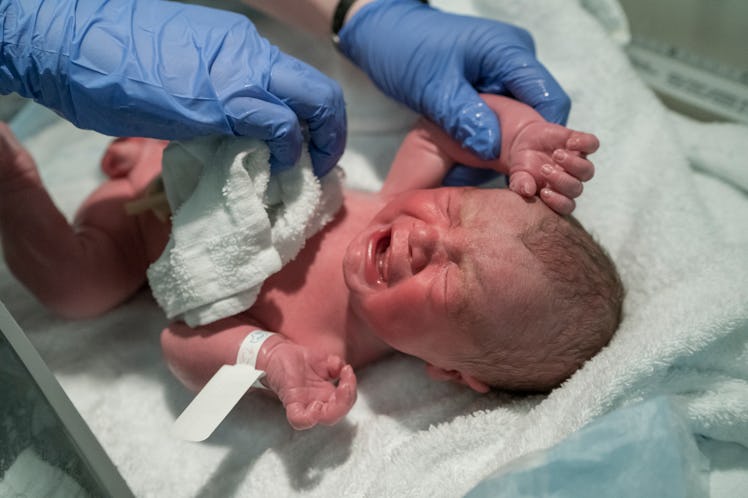How Should You Bathe A Newborn? Hospitals Have No Clue
Hospitals give parents inconsistent and sometimes conflicting bath time advice.

Newborns enter the world wearing a protective coating, a layer of good bacteria and vernix — a white, creamy biofilm that covers the skin of the fetus during the last trimester. How and when that layer is washed away has been connected to that baby’s ability to regulate temperature, develop normal blood glucose, and fight infection. So what’s the best time and way to bathe newborns? A new study surveying nurseries across the country revealed there’s no consensus or standard when it comes to a baby’s first bath. The truth is, we don’t really know.
“There’s some things we do in medicine because we’ve always done them this way,” says Ann Kellams, M.D., professor of pediatrics at University of Virginia and lead author of the study. But in reality, there’s very little evidence to support most hospitals’ newborn skin care approach, she says.
When to Bathe a Newborn
Kellams’s team surveyed 73 medical directors on their institutions’ skin care practices: the timing of first bath, skincare practices, skincare products, and skincare education. “The most striking finding was the wide variety in all those categories,” Kellams says.
Eighty-seven percent of surveyed nurseries delayed bathing by at least six hours, the minimum recommended by the World Health Organization. But even in that group, bathing time varied widely. Some hospitals waited as long as 24 hours after birth to bathe babies, and 10% of hospitals sent the baby home without a bath.
Current evidence suggests that delaying bathing by more than 12 hours is linked to improved temperature regulation, reduced hypoglycemia, and increased breastfeeding rates. The WHO lists 24 hours as the optimum wait-time before bathing a newborn. But the evidence for waiting to bathe for 12 hours or more after birth is still limited.
How to Bathe a Newborn
As for procedures and products, 85% of nurseries gave sponge baths and 96% used soap (Johnson & Johnson was the most commonly used brand name, though there’s no evidence to suggest it’s superior). Some research suggests that mild baby soaps remove blood, urine, and feces better than water alone while favorably lowering skin pH. However, there’s also emerging data that suggests soaps and detergents may disrupt the newborn’s skin barrier, Kellams says.
Parent education on newborn skin care was equally as inconsistent among hospitals. The advice offered by nursery officials spanned the gamut, from immediate immersion bathing once the family is home to waiting until the umbilical cord falls off, from using a mild soap to no soap, from a full bath to only sudsing the scalp for the first few weeks. Ultimately, the conflicting advice leaves new parents confused.
Unsurprisingly, the evidence hospitals cited to back up their skin care approach advice was “scant,” the study authors wrote, because there just isn’t that much research in the first place. “We don’t have enough evidence to inform skincare,” Kellams says, or to measure which institutions have better practices than others.
Kellams says her best advice for parents is “just because it’s in the store labeled for babies doesn’t mean it’s the best thing.” Despite what the labels of cute, smelly baby products would have you believe, “less is more with newborns,” she says. Doctors also warn that “natural” isn’t always better. Some natural or herbal products that are safe for adults haven’t been tested on newborns and could cause a reaction.
Up next, Kellams says research will examine the timing of babies’ baths. Her hypothesis is “that waiting longer would be better.” There also needs to be more research on the products we use. “Should we be using soap at all? Or should we be using oil-based cleansing, or just water?” Kellams says. “At this point, we only have hypotheses. We only have guesses.”
Tips for a Baby’s First Bath
- Wait until at least six hours after birth for the first bath.
- Delaying the first bath for more than 12 hours may have some benefits. The WHO recommends waiting 24 hours.
- When it cpmes to baby products, less is more. Mild soaps that have been tested on newborns are best.
This article was originally published on